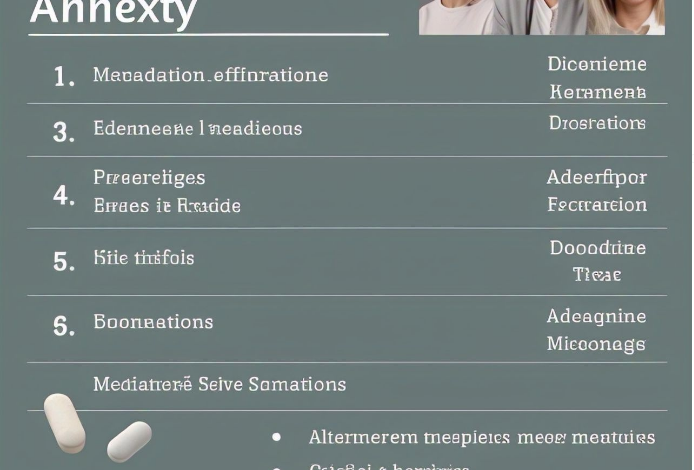What Are The Top 10 Medications For Anxiety: Your Complete Guide to Finding Relief

Are you wondering What Are The Top 10 Medications For Anxiety and how they can help? Don’t worry—you’re not alone. Anxiety is a common issue, and there are medications available that can help ease your symptoms and get you back to feeling your best.
In this post, we’ll explore the top 10 medications for anxiety, their benefits, and possible side effects. Whether you’re dealing with everyday stress or a diagnosed anxiety disorder, this guide will give you the information you need to understand your options and discuss them with your doctor. Let’s dive in!
What Are the Top 10 Medications for Anxiety? Your Quick Answer
Anxiety can feel overwhelming, but the right medication may help you regain control. If you’re curious about what are the top 10 medications for anxiety, you’re in the right place. Medications are often prescribed to help reduce symptoms, making life feel a bit easier.
In this guide, we’ll walk through the most commonly used anxiety medications, including SSRIs, SNRIs, benzodiazepines, and others. By the end, you’ll have a clearer understanding of your options so you can discuss them confidently with your doctor.
SSRIs: The Most Popular Anxiety Medications Explained
Selective serotonin reuptake inhibitors (SSRIs) are one of the most common treatments for anxiety. These medications work by increasing serotonin levels in the brain, which helps regulate mood and reduce feelings of worry. They’re often the first choice for doctors when treating anxiety disorders.
Some popular SSRIs include fluoxetine (Prozac), sertraline (Zoloft), and escitalopram (Lexapro). These medications usually take a few weeks to start working, but the wait is often worth it for many people. They are considered safe for long-term use and are non-addictive.
Like any medication, SSRIs can have side effects. Some people experience nausea, dizziness, or trouble sleeping when they first start taking them. These side effects often go away after a few weeks. It’s always best to talk with your doctor if you have any concerns.
SNRIs and Anxiety: How They Help Calm Your Mind
Serotonin-norepinephrine reuptake inhibitors (SNRIs) are another class of antidepressants that treat anxiety. They work by boosting both serotonin and norepinephrine levels in the brain. This helps you feel calmer and more in control.
Common SNRIs include duloxetine (Cymbalta) and venlafaxine (Effexor XR). These medications are great for people who may also experience physical pain along with their anxiety. It might take a few weeks for the effects to kick in, but many find them helpful in the long run.
Side effects of SNRIs can include headaches, dry mouth, and fatigue. It’s important to take these medications as prescribed and follow up with your doctor to make sure they’re working well for you.
Benzodiazepines: Fast Relief but with a Warning
Benzodiazepines provide quick relief for anxiety. Medications like alprazolam (Xanax) and lorazepam (Ativan) work fast, often within minutes, to calm your mind and relax your body. They are best for short-term anxiety or panic attacks.
These medications, however, come with some risks. They can be habit-forming, and their effectiveness may decrease over time. For this reason, doctors often prescribe benzodiazepines only for short periods, such as during a stressful event or while waiting for another medication to take effect.
Side effects can include drowsiness, dizziness, and trouble concentrating. It’s important not to mix these medications with alcohol or other sedatives. Always follow your doctor’s advice when using benzodiazepines.
Beta-Blockers and Buspirone: A Closer Look
Beta-Blockers for Physical Anxiety Symptoms
Beta-blockers, such as propranolol (Inderal), are sometimes used to treat the physical symptoms of anxiety, like a racing heart or trembling hands. These medications are not usually prescribed for general anxiety but can help in specific situations, like public speaking.
- Pros: Quick relief for physical symptoms
- Cons: May not address emotional anxiety
- Side Effects: Fatigue, cold hands, and dizziness
Buspirone: A Safer, Non-Addictive Option
Buspirone (BuSpar) is a slower-acting medication used to treat chronic anxiety. It works gradually over weeks to improve your mood and reduce nervousness. While it’s not as fast as benzodiazepines, it has fewer risks and is non-addictive.
- Pros: Low risk of dependence
- Cons: May take weeks to work
- Side Effects: Drowsiness, dizziness, and nausea
Both medications can be helpful depending on your specific needs. Always discuss the best option with your doctor.
Understanding Anxiety Medications: What You Need to Know

When considering what are the top 10 medications for anxiety, it’s important to understand how these drugs work. Medications help balance chemicals in your brain to improve your mood and reduce anxiety. These medications can make daily life easier for people with anxiety, but it’s important to use them under the guidance of a healthcare professional.
For long-term anxiety, medications like SSRIs and SNRIs are typically prescribed because they are effective and have fewer side effects compared to older drugs. For people who need quick relief, benzodiazepines are often used, but they are not recommended for long-term use. Understanding the benefits and risks of these medications is essential before starting any treatment.
The Role of SSRIs in Anxiety Treatment
SSRIs are one of the most common medications prescribed for anxiety. They are called Selective Serotonin Reuptake Inhibitors and work by increasing the amount of serotonin in the brain, which helps to regulate mood. SSRIs are often the first choice for treating anxiety disorders because they are effective and have fewer side effects than other medications.
Common SSRIs used for anxiety include medications like Zoloft (sertraline), Lexapro (escitalopram), and Prozac (fluoxetine). These medications can take a few weeks to start working, but they help many people manage anxiety symptoms over time. It’s important to stay in touch with your doctor to adjust the dosage if needed.
SNRIs: A Powerful Option for Anxiety
SNRIs, or Serotonin-Norepinephrine Reuptake Inhibitors, are another group of medications used to treat anxiety. They work similarly to SSRIs but also affect norepinephrine, another brain chemical linked to mood regulation. SNRIs can help relieve both anxiety and depression, making them a good option for people who have both conditions.
Common SNRIs like Cymbalta (duloxetine) and Effexor (venlafaxine) are usually prescribed when SSRIs are not effective or suitable for a person’s specific condition. These medications can help you feel better, but they also take time to work, so it’s important to be patient and work closely with your doctor.
Short-Term Solutions: Benzodiazepines
When looking into what are the top 10 medications for anxiety, benzodiazepines are often mentioned. These medications work quickly to reduce anxiety and are helpful for short-term situations, like a panic attack or extreme stress. Benzodiazepines can provide fast relief, making them ideal for emergencies, but they come with risks like dependence and tolerance.
Benzodiazepines include drugs like Xanax (alprazolam), Valium (diazepam), and Ativan (lorazepam). Due to their potential for addiction, doctors usually prescribe them only for short-term use. Always follow your doctor’s instructions carefully when taking benzodiazepines to avoid any problems.
Conclusion
In conclusion, what are the top 10 medications for anxiety varies from person to person. The right medication depends on your specific symptoms and how your body reacts to treatment. SSRIs and SNRIs are often the first choices for doctors because they help with long-term anxiety. However, medications like benzodiazepines and beta-blockers are also useful for short-term relief.
If you or someone you know is dealing with anxiety, talking to a doctor is the best step. They can guide you to the right medication and help you manage any side effects. Remember, finding the right treatment can take time, so be patient and keep working with your healthcare provider.
FAQs
Q: What are the top 10 medications for anxiety?
A: The top 10 medications for anxiety include SSRIs, SNRIs, benzodiazepines, beta-blockers, buspirone, and others. The best choice depends on your needs.
Q: How long do anxiety medications take to work?
A: It can take 2-6 weeks for anxiety medications like SSRIs and SNRIs to start working. Some may feel relief sooner, but patience is key.
Q: Are SSRIs addictive?
A: No, SSRIs are not addictive. They are safe for long-term use but should be taken under a doctor’s supervision.
Q: Can I stop taking anxiety medication suddenly?
A: No, always talk to your doctor before stopping any anxiety medication. Stopping suddenly can cause withdrawal symptoms.
Q: What if anxiety medications don’t work for me?
A: If medications don’t help, talk to your doctor. They may adjust your dose or suggest a different medication or therapy.


